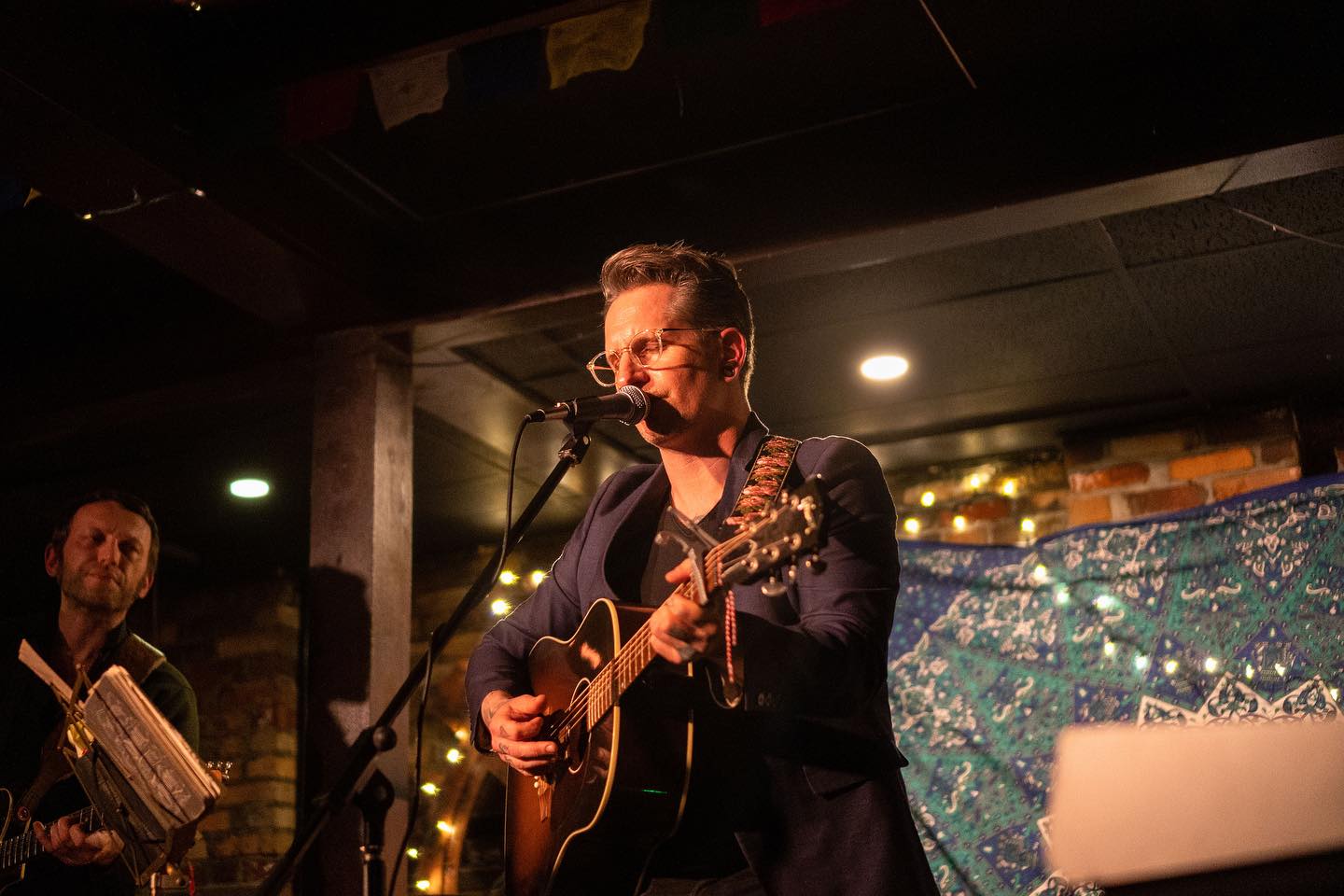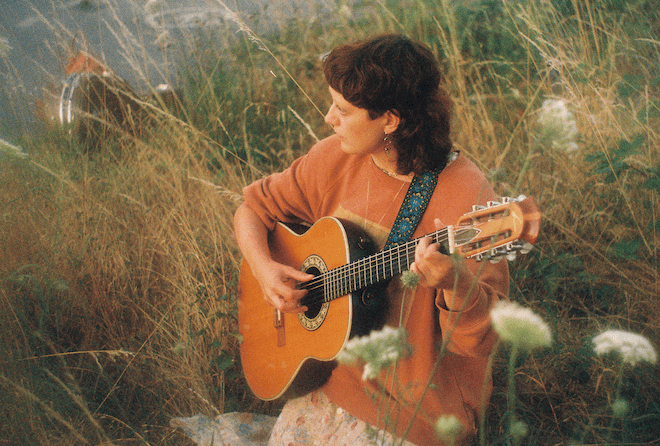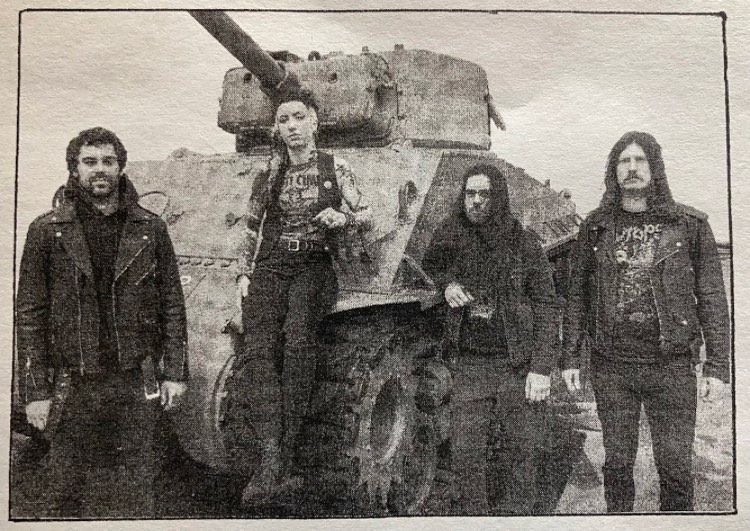Folk Night: Reviving Intimate Music in Victoria
An interview with the team behind Folk Night to discuss what they're doing to bring back the intimate music scene in Victoria.
Posted on November 23, 2024 by Aidan Polglase

Introduction
Victoria's live music scene is grappling with a lack of venues that cater to quieter, lyric-driven performances. In response, non-profit Folk Night has emerged for singer-songwriters and music lovers seeking meaningful connections through local live music. Created by local musicians inspired by the cozy vibe of The Vault in Nanaimo, the series offers a carefully curated space where original music thrives thanks to a lineup of artists that never misses and the creators ability to make a space work visually and sonically.
As rent increases in Victoria, venues are closing and room fees rise. Folk Night’s organizers are not immune, and were recently forced to find a new location after their long-time host came to them with the unfortunate news that their room fee was increasing from $0 to $600.
Despite these challenges, the organizers of Folk Night are not discouraged. Instead they are innovating - crafting DIY solutions to provide platforms for artists while maintaining high-quality, consistent events. With cozy lighting, tapestries on the walls, thoughtful sound design, and a mandate on attentiveness, the series is showing artists what can and should be done with ‘blackbox’ venues like Little Fernwood and Fairfield Community Center.
We had a chance to speak with Maita, Jeremy, Jacob and Shaggy, the creators of Folk Night. Check it out below.
Start of the Interview: Inspiration
What inspired you all to start Folk Night, and how has it evolved since its inception?
Jeremy: Well, we were playing a show in Nanaimo at The Vault, and during a break, we were watching another band perform. We started talking about how The Vault is such a great venue—it has this amazing vibe, people actually listen, and the music feels truly appreciated there. It was something we realized was hard to find in Victoria. So we thought, "What if we just rented a venue and tried to recreate that experience?"
Do you think Folk Night has evolved from that original vision, or is it still the same concept you started with?
Maita: The original idea was, as singer-songwriters, to create our ideal venue—a place where people really listen to the lyrics and where original music can thrive. It’s not about playing covers, making people dance, or putting on a flashy performance. It’s about creating a space where music lovers can connect with the art. There aren’t many places in Victoria that facilitate that kind of vibe. If anything, it’s evolved in terms of being better organized and curated. We’ve honed in on what we’re doing and gotten better at executing the original vision.
Jacob: Yeah, it’s definitely going to grow and get bigger. It’ll probably even expand beyond just folk music. But the ethos is the same: creating a space where good music can be heard by people who truly want to listen.
Can Anyone Do This?
You’ve all been artists for a while, so you had participated in shows even if you hadn’t organized them before. Do you think setting up a concert series like Folk Night is something anyone can just jump into, or does it require experience?
Shaggy: I think anyone can do it, but there are definitely skills you need to learn, like running sound for example. That’s not something you can just wing.
Jeremy: Yeah, doing our own sound has saved us so much money. It’s expensive to hire out, but we handle it in-house. We also have our own stage gear, which helps. Everyone in the team brings their own expertise to the table, and if we didn’t have that, it would be a lot harder.
Jacob: Right. Even things like Nathan’s posters [Nathan designs all of Folk Night's posters for free, saving at least $100 per event]. Folk Night looks good, sounds good, and runs well because we all contribute in different ways. Having a cohesive aesthetic—whether it’s the stage, the posters, or the overall vibe—makes a huge difference.
Jeremy: I think our experience as artists was crucial. We’ve learned from past shows, made connections, and understand what musicians need. Seeing how much artists appreciate the space drives us to keep improving.
Shaggy: Definitely. Part of our intention was to create something between an open mic—where you only get two songs—and booking a bigger venue like Lucky or Capital Ballroom, where the risk is high. Victoria has so many talented musicians who deserve a platform to share more than just two songs for a drink. We know how to set up a space, curate a lineup, and create an atmosphere where artists feel supported and can share their art. At its core, Folk Night is about giving a platform to original music and uplifting singer-songwriters, giving them a chance to share their craft on a stage to a listening room.
Personal Careers
How has running Folk Night impacted your own musical careers?
Maita: It’s been great for all of us to have a venue to play at. Every show we’ve done has felt really special.
Aidan: You’ve all done at least one Folk Night set, right?
Maita: Yeah, and I remember Jacob joking during his set, saying something like, "If you really want to play Folk Night, go make your own venue." It was funny, but also kind of true. Beyond that, it’s been helpful to make so many connections with other artists. We haven’t fully leveraged those connections yet, but I think it’ll come in handy down the road.
Shaggy: For me, Folk Night has been a huge source of experience that’s opened up other opportunities. I’ve since done sound for other events, including Woodstove (Festival). The organizers trusted me because I’d done sound for artists they already booked, and that gave me a chance to set up in Tattoodale and host 24 acts there. Folk Night gave me the skills and confidence to create that space, and I think the artists appreciated it. It’s been personally rewarding and has given me hope for the scene and my professional goals.
Jeremy: One thing I’d add is how it’s influenced our taste as performers. We started out playing in loud rooms as an indie folk band, which isn’t the most high-energy style. Playing in loud spaces can change the way you perform and how you connect with the audience. Folk Night has shown us the value of a thoughtful, intimate space. It lets us focus on taste, touch, and lyricism in a way that louder venues don’t allow. It’s something that separates good artists. If you see someone like William Prince at a venue like Capitol, his songs hit differently than they would in a punk bar. Folk Night provides that avenue for a more nuanced, detailed approach to music.
Organic Growth
From what I know about Folk Night, you don't rely on marketing strategies or tons of ads. Yet, you’ve built a really loyal audience. How did you do that?
Jeremy: I think we just had a great show. It was a great space, and people talked about it.
Shaggy: We did try different promotional avenues—printing posters that Nathan designed, putting them up around the city, even paying the poster collective to help. We also boosted Facebook ads. But I think the key to building our audience was word of mouth. People were excited to see their friends perform a full set, not just a couple of songs at an open mic.
Jacob: Consistency was a big part too. We wanted every show to be reliable, where people would come out for Folk Night itself, not just the artists on the bill. That’s something we admired about venues like The Vault or my hometown bar, The Cap, in Halifax. You could go any night and see a great show for an affordable price without knowing who was playing. That sense of consistency and quality was missing in Victoria.
Aidan: Totally. The promotions were more of a reminder, but the organic growth mattered most.
Jeremy: Yeah, and artists talk to each other. Touring musicians especially share venue recommendations. We’ve had people from all over BC—and even Argentina—want to play Folk Night because they saw someone they knew had performed there.
Jacob: A friend of ours from Kamloops once messaged us about playing at Folk Night without even knowing we ran it. That’s when we realized Folk Night had taken on a life of its own.
Setting the Vibe
You’ve also done an amazing job creating a vibe. The tapestries, the artist curation—it’s noticeable. What do you think goes into setting that vibe?
Jeremy: Honestly, a lot of it is about setting expectations. Maita introducing the artists and emphasizing that it’s a listening space makes a big difference.
Shaggy: We also wanted to create a cozy, intimate setting. A lot of this music comes from bedrooms and living rooms, so we tried to bring that feel to the stage. Warm rugs, tapestries, lamp light—all those small touches make the space feel inviting, like you’re stepping into someone’s world.
Jeremy: It’s like walking into a yoga studio. You immediately know what the space is for. Folk Night has a clear purpose: intimate, listening-focused performances. People pick up on that.
It’s intentional in every way, even with the sound. I make sure the artists hear themselves in the monitors as they would in a quiet room. That helps them make subtle adjustments to their performance while trusting that the house sound will amplify them perfectly. It’s all about supporting the artists and creating the best space for their music.
Trying Times
What are your thoughts on the live music scene in Victoria right now? The Victoria Event Centre just closed, and it seems like we’ve seen more closures than anything else lately.
Shaggy: Yeah, it’s a sad state in Victoria right now. There are fewer spaces but just as many artists. We’ve been lucky to have a good relationship with our venue for the past couple of years, but rent in the core is skyrocketing—some places are seeing a 40% increase this year. A lot of venues are closing because they just can’t afford it. It’s tough to find spaces that both fit the vibe we’re trying to create and don’t take so much of the revenue that we can’t pay the artists fairly. There are rooms available in Victoria, but if you’re paying $600 in room fees and only bringing in $1,000 to $1,200, it makes it nearly impossible to pay artists a proper wage. What we need are more spaces that value live music and the arts—spaces that make their money off food and drinks while letting us fill the room with good vibes, good music, and good people.
Jeremy: There’s a good scene here—lots of talented bands and artists. But they don’t have anywhere to play. And the places that are available often cater to heavy music. The kind of music we’re interested in loses its magic when you’re forced to crank your amps in a loud, punk-style venue just to be heard. We need spaces that can support quieter, more intimate performances.
Shaggy: More venues wouldn’t hurt the heavy scene—it’s already thriving. But other styles of music need room to grow too.
Jeremy: When we started playing shows in Victoria, it felt like whoever cranked their amp the loudest got the most attention. That alienates a lot of the mid-twenties-and-up audience who aren’t looking for high-energy shows. Folk Night has been great for drawing a mixed crowd of all ages.
Maita: The audience is here in Victoria—people love going to shows. But without enough venues, they’re not in the habit of going out. If we had more events and spaces, that habit would grow.
Future Plans
What's next for Folk Night?
Maita: Well, I’m taking all the Folk Night savings and getting a boob job.
Aidan: On the record?
Maita: No, no, no. Just kidding!
(We decided that was staying on the record)
Shaggy: Long-term, we want to continue monthly events, hopefully getting back to Thursdays. We’re also dreaming of expanding—maybe introducing full-band folk rock nights in bigger venues.
Maita: My ultimate goal is to do something like Woodstove here. Imagine a Folk Night festival with multiple venues across the city.
Shaggy: That would be amazing—a soulful, walkable festival some time in the Fall.
Maita: Fernwood would be the perfect anchor.
Shaggy: Truly. But like anything, it’s one step at a time, one show at a time, one song at a time.
Maita: Perfect ending, Shaggy. One song at a time, baby.
Update March 20, 2025: Folk Night now lives at The Coda
Latest Articles
Let us know if you can't find what you're looking for. Our blog is community driven and we would love to hear from you.


